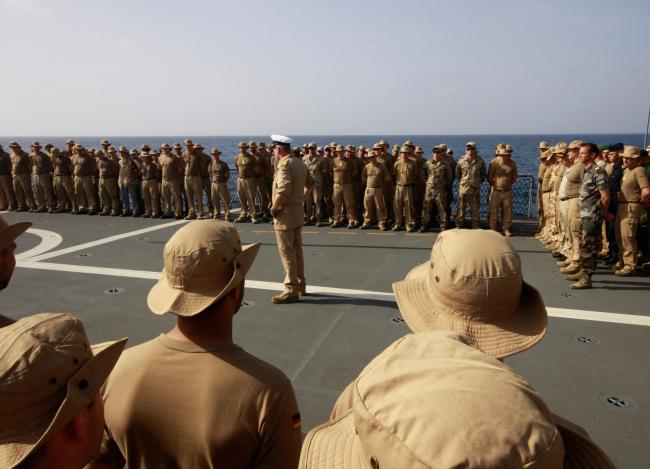Since Rear Admiral Jürgen zur Mühlen assumed force command of the EU Naval Force on Sunday 6 April, he has been very busy ensuring that his flagship, FGS Brandenburg, and the rest of the EU Naval Force warships and maritime patrol aircraft under his command are fully prepared for the important role that they will fulfil over the next four months. This is the second time that Germany has held the Force Command for Operation Atalanta off the Horn of Africa.
A key role for the EU Naval Force (EU NAVFOR) Somalia Operation Atalanta is the protection of World Food Programme (WFP) vessels as they sail within the piracy high risk areas. WFP ships have to travel close to the Somali coast in order to deliver food to the Somali people. Many have suffered from years of political instability, poor harvest and drought. The EU warships also contribute to the protection of the international trade shipping routes in the Indian Ocean and Gulf of Aden.
In addition to the German frigate Brandenburg and replenishment tanker Rhön, during his time with Operation Atalanta, Rear Admiral zur Mühlen will also have force command of several naval warships from Greece, Spain, France and the Netherlands. His eyes in the sky will be two Maritime Patrol and Reconnaissance Aircraft (MPRA) from Spain and Germany.
Towards the end of 2011, the number of piracy incidents off the coast of Somalia started to reduce and no ship has been pirated off the Somali coast since May 2012. Whilst the reduction in attacks is welcomed by Rear Admiral zur Mühlen, he warns that now is not the time for complacency. “Despite success in containing piracy, the pirates’ business model is fractured, but not broken. That is why naval forces and the maritime industry’s efforts cannot decrease at this point. We need to ‘hold the line’.“
Chess at sea
With the support of his 35 international staff from twelve different nations based on board FGS Brandenburg, Admiral zur Mühlen will ensure that the EU Naval Force warships and aircraft patrol the area of operations, with the aim of achieving the highest possible level of security for the ships of the World Food Programme and other merchant ships. “This demanding task is achieved due to the excellent coordination and cooperation we have with our counter piracy partners - NATO and the Combined Maritime Forces, as well as the independent deployers.“
First visits under the EU flag
Rear Admiral zur Mühlen’s first few days with the EU Naval Force were marked by visits with political and military authorities of the Republic of Djibouti, as well as representatives of the European Union and contributing nations based in Djibouti. Two of the visits were with the French Operational Commander in Djibouti, Brigadier General Joël Rode, and the European Support Element Atalanta based in Djibouti. During visits with Major General Cheikh Ibrahim Zakaria, Chief of Staff of the Djiboutian Armed Forces, existing cooperation was discussed.
Admiral zur Mühlen also visited the Japanese Naval Air Base in Djibouti. After a presentation from the Japanese Commodore, Captain Heromi Asanuma, both parties discussed future collaboration. “In facing this vast area of operations, the capabilities of the Japanese, Spanish and German Maritime Aircrafts are of utter importance. The will to collaborate is predominant, I am assured of that” the Admiral stated.
Inauguration speech for the crew of Brandenburg and his staff
Immediately after Admiral zur Mühlen took force command of the EU Naval Force, he also took national command for all German personnel involved in operation Atalanta. In addition to the crews of frigate FGS Brandenburg and the replenishment tanker FGS Rhön, the military personnel based in Djibouti will also be led by him. This includes the German Support Element and the staff manning and running the Maritime Patrol and Reconnaissance Aircraft, who operate their P-3C Orion aircraft from a Djibouti air base.
As a sign of the national handover, Commander Gerald Liebich, Commanding Officer of FGS Brandenburg, presented Admiral zur Mühlen with a symbolic baton. This event was also attended by Lieutenant General Hans-Werner Fritz, Commander of the Joint Forces Operations Command of the German Armed Forces in Potsdam.
In his speech addressing his staff and Brandenburg’s crew, Admiral zur Mühlen stressed the significance of Operation Atalanta for Germany and the European Union. He emphasized his firm belief that every man and woman will “pull their weight” to conduct the mission successfully. “I know everybody is prepared very well for this. You have my complete trust.”
